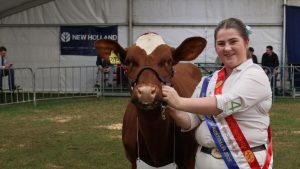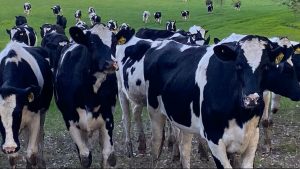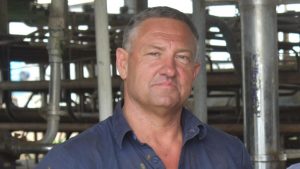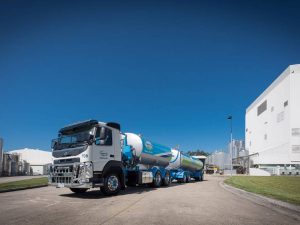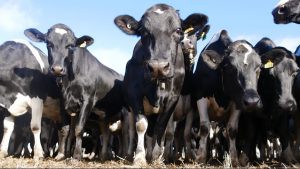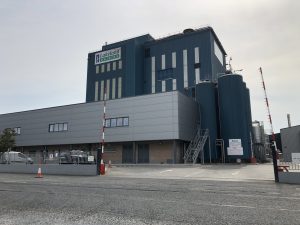
But that’s not the way dairy farmer Rod Williams is looking. He’s peering at the future, and the next generation of dairying, by offering employment on his Stroud Road property, Liaweena.
“We’re looking for someone with a can-do attitude, someone who is passionate about animals, and with a commitment you don’t get with too many other jobs – and you’ve got to be an early riser,” said Mr Williams.
“Which knocks a lot of people out straight away!”

The prospective worker would be joining a fourth-generation dairy farmer, whose family has been on these 142 hectares in the Karuah Valley since 1954.
Liaweena is a smaller operation. Rod Williams, and wife Nicole, have a herd of just 80 cows, producing about 1800 litres each day in a compact brick dairy where milking goes on each and every morning, from about 5am, and afternoon.
“We keep it simple and old school, to a degree,” explained Mr Williams.
But not entirely “old school”. In the search for a worker, Rod Williams has taken to social media, posting a notice about the job on local Facebook community sites, pointing out, “This position would suit someone looking to start a career in agriculture or someone who may not necessarily have considered dairy as an alternate career path”.

Being a small operation, Nicole Williams said, the employee would “get to do everything”.
“You get to experience everything. It’s not only milking, it’s calf rearing, it’s tractor driving, it’s fencing,” Mrs Williams said.
Her husband added there was scope for education, including undertaking a TAFE Certificate III in Agriculture and learning about artificial insemination.
“It’s a challenge, it’s outdoors; I don’t know what sort of view you get from your office window,” Mr Williams said, gesturing up the valley towards the distant ranges.
“There’s the variety, and education. There’s just a whole unique skill set that goes with it.”
Mr Williams acknowledged what some might see as drawbacks to the job. There was the split shift, with work at each end of the day.

Pay for the job starts at about $22 an hour, with the employee working a 76-hour fortnight.
There was also the perception that dairying was a shrinking industry.
Dairying in Australia has faced a host of challenges and pressures in the past couple of decades, from the deregulation of the industry in 2000 to the impact on milk prices of the increasingly powerful supermarkets.
Then there are the ever-changing moods of Mother Nature, from droughts to floods.
In some ways, Liaweena is a throw-back to the days when smaller family dairies dotted the hills around Gloucester, Stroud and Dungog.
But since deregulation, Rod Williams said, “we’ve probably lost about 95 per cent of all dairies that were around in 2000”.

With such a turbulent recent past, a prospective employee may wonder about a future in milk, conceded Scott Wheatley, the Chair of the Hunter Dairy Development Group.
“People are saying that all the time – ‘People are leaving [the industry] in droves, so why would you want to make a career out of it?’,” Mr Wheatley, a fourth-generation dairy farmer, said.
“But it’s not all doom and gloom.”
He pointed out recent weather conditions had created “a ripper of a season”, and milk prices had been healthy at about 60 cents a litre.
Although many farm operating costs had escalated “ridiculously”.
However, finding workers in these times, particularly with the impact of COVID-19, was tough.

“Every industry is struggling to find people at the moment,” Mr Wheatley said.
Indeed, one of Mr Wheatley’s young workers had left for another job, on a Central Queensland cattle station, this week, and so he was contemplating the search for a new employee. To attract workers, he said, farmers were having to pay above award rates.
“Unless you pay really well and it’s an attractive industry, you struggle to get staff,” he said.
Still, in the face of COVID, Mr Wheatley argued, dairying offered work that was mostly outdoors, and it was far removed from the customer tensions in areas such as hospitality and retail at the moment.
“I’d rather deal with cows than people any day,” Mr Wheatley said.
“If anyone is looking for a tree change, it’s a good time to do it.”

Rod and Nicole Williams have received a handful of responses to their job ad.
A couple of the prospective employees are looking at making a career change; one is a veterinary nurse in the lower Hunter, another works in manufacturing.
While they believe the job could suit a school leaver, the Williams know that with so many city escapees heading for the hills around their area that maybe a tree changer will look to the dairy.
“We’ve got all these new people coming into the area who probably aren’t aware of what’s out there,” said Nicole Williams. “It might spark their interest.”
Mrs Williams said with the growing “farm to plate” movement, the skills learnt on the property could lead to a boutique dairy product business, such as cheese-making.
With none of their four sons wanting to take over the farm at this stage, Mrs Williams said perhaps Liaweena could become a boutique dairy in the future.
“There could be an opportunity down the track for someone to entertain that, you never know,” she said.

But for now, when the Williams employ a worker, they may just get some time off from what is a relentless seven-days-a-week job.
They have had workers in the past, and that has allowed the couple to take short holidays, but they are looking forward to having someone to share the load at Liaweena.
“You can’t just walk away and leave it with anyone,” said Mr Williams. “You’ve got to have someone who is up for it.
“At the end of the day, if we can get someone to help us out, and if you get the right person, there’s no shortage of work.”
“They will always get a job anywhere they go,” added Mrs Williams, highlighting another benefit of the job. “They can work anywhere in Australia, dairying. They’re so sought after. Milk’s got to come from somewhere.”

And by passing on what they know, the Williams hope that “somewhere” for milk remains the Hunter, and that dairying has a future locally.
“We don’t want to go importing milk,” Nicole Williams said. “You’ve just a got a really quality product. You don’t want to go mucking around importing this sort of stuff.”

Rod Williams said in recent years for the industry, “There’s been almost no light at the end of the tunnel”.
But since he is looking the other way along the tunnel, towards the future, Rod Williams sees light and the prospect of a rewarding career in dairying for whomever takes up the job.
“It’s not for everyone,” he said, “but the ones who are up for it, they just blossom.”





